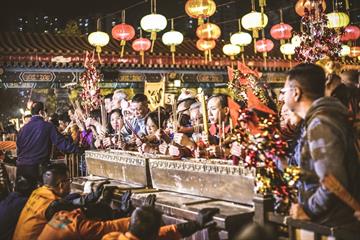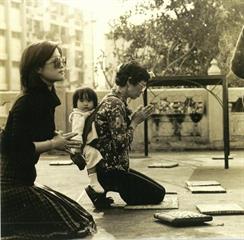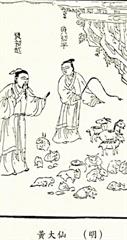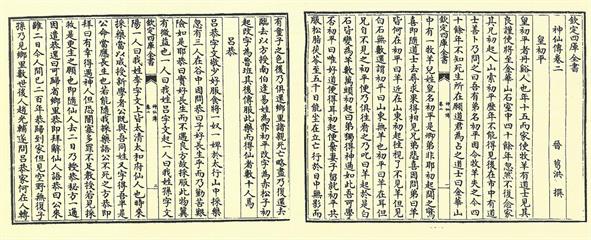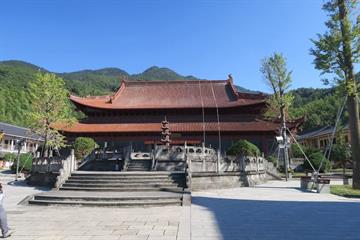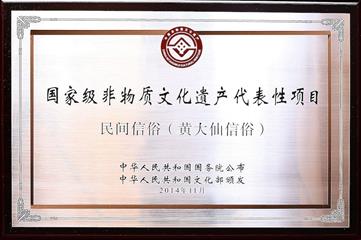Wong Tai Sin Belief and Customs in Hong Kong refers to the Hong Kong folk belief and worshipping activities of Master Wong Tai Sin, which can be traced back to Jinhua, Zhejiang, China, and is inherited from the Pearl River Delta region of Guangdong. It includes beliefs, values, a culture of worship, legends, and the time- and season-related customs and activities, relevant rituals, literature, classics, and cultural relics arising therefrom.
Master Wong Tai Sin refers to a Taoist called Wong Cho Ping, who was born in a poor family in c. 328 during the Eastern Jin dynasty. According to Master Wong Tai Sin’s own narration, at the age of 8 he began herding sheep in the vicinity of Red Pine (Cisong) Mountain in northern Jinhua County, Zhejiang Province. When he was 15 years old, Master Wong Tai Sin encountered an immortal who then taught him techniques of meditation and herbal refining, after which he spent 40 years practicing in the mountains. Later, his older brother, Wong Cho Hei reunited with Master Wong Tai Sin after following the guidance of a Taoist. When his older brother asked him about the whereabouts of the sheep, Master Wong Tai Sin led him to the east side of the hill. He pointed into the distance and shouted at a cluster of white rocks. In an instant, the rocks transformed into sheep. Wong Cho Hei was amazed by the miracle and developed the will to learn and practise as well. Therefore, he started self-deprivation together with Master Wong Tai Sin. In the end, both of them became immortals. Master Wong Tai Sin is also called the Red Pine (Cisong) Immortal because he was known to live in hermitage there.
In December 2014, the Wong Tai Sin Belief and Customs in Hong Kong was successful in its application to be named a national intangible cultural heritage. Sik Sik Yuen Wong Tai Sin Temple is both the sponsor and the representative institution of the Wong Tai Sin Belief and Customs in Hong Kong. The basic contents of the Wong Tai Sin Belief and Customs in Hong Kong includes beliefs, customs, Taoist rituals, charity and other aspects. Belief aspects include: the core tenet of “acting benevolently and teaching benevolence”, the religious practice direction of “The Master's Ten Teachings'', the tradition of offering free medical consultations and Chinese medicine, and so on. In addition, the concept of “answering whatever he is asked for”, miracle of the “powerful spirit”, and the communion and harmony of the worship of masters from Confucianism, Buddhism, and Taoism are also core ideas of the Master Wong Tai Sin Belief and Customs. Customs aspects include divinations for fortune and health, Master Wong Tai Sin’s Birthday on August 23 of the Chinese calendar, the “first incense offering in Chinese New Year'', the Great Offerings ritual, and Taoist wedding ceremonies. Taoist ritual aspects include the inheritance of its scriptures, repentance rituals, and large prayer assemblies to preach and promote its belief. Charity aspects include the development of education, medical care, social services and other multi-faceted developments.
